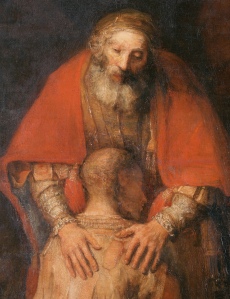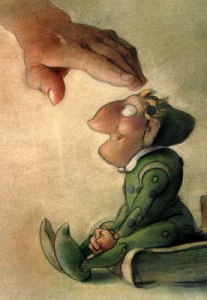A psalm of David:
“What is man that you are mindful of him, the son of man that you care for him?” (Psalm 8:4)
David might as well have asked, “Just who do we think we are?”
I’m reminded of a children’s story by Max Lucado. It’s called You Are Special and it’s a beautiful metaphor of a loving Creator and His children. It’s worth a short re-telling here, but I would encourage you to go to your local library and check it out for yourself.
This is a story about the Wemmicks. The Wemmicks were small wooden people who were carved by a woodworker named Eli. Eli’s shop sat on top of the hill overlooking the Wemmick’s village. Each Wemmick was different. They were created in all different sizes, shapes, and colors. Every day the Wemmicks wandered around their village putting stickers on each other. They had a box of golden star stickers and a box of gray dot stickers. Some Wemmicks were talented and smart, and had smooth paint and lovely features. The other Wemmicks would come and place star stickers on them. But some Wemmicks could do little. Their paint was chipping and perhaps they couldn’t do what some of the other Wemmicks thought was important. They would get dots.
Punchinello was a Wemmick who had many dots. People would see all of his gray dots and give him more simply because he had so many dots to begin with. He began to avoid the other Wemmicks for fear of receiving more dots. What’s worse, he began to believe that he was no more than the dots that covered him.
Then one day Punchinello met a Wemmick unlike any he’d every seen. Her name was Lucia, and she did not have any stars or dots. It wasn’t that the other Wemmicks didn’t try to give her stickers, but neither the stars nor the dots stuck to her. Punchinello was astounded and asked Lucia how she did it.
“It’s easy,” Lucia replied. “Every day I go see Eli.”
“Eli?”
“Yes, Eli. The woodcarver. I sit in the workshop with him.”
“Why?”
“Why don’t you find out for yourself? Go up the hill. He’s there.”
So the next morning Punchinello set off to see Eli. When he entered the shop, he was frightened. What if Eli gave him a dot, too? He turned to walk out when Eli called his name.
“Punchinello?”
Punchinello turned to Eli as he examined the small wooden person. Noting his dots, Eli could sense Punchinello’s sadness. Punchinello tried to explain himself to Eli, but the gentle woodcarver didn’t seem to care about the dots.
“Oh, you don’t have to defend yourself to me, child. I don’t care what the other Wemmicks think.”
“You don’t?”
“No, and you shouldn’t either. Who are they to give stars or dots? They’re Wemmicks just like you. What they think doesn’t matter, Punchinello. All that maters is what I think. And I think you are pretty special.”
Punchinello had never had anyone speak to him like this. Eli went on to explain that Punchinello was special because he made him. Punchinello was his, and Eli loved him.
Punchinello asked Eli about Lucia.
“Why don’t the stickers stay on her?”
The maker spoke softly. “Because she has decided that what I think is more important than what they think. The stickers only stick if you let them.”
“What?”
“The stickers only stick if they matter to you. The more you trust my love, the less you care about their stickers.”
–from You Are Special, by Max Lucado
We assume our identities through a myriad of different channels. We let our jobs define us. We let where we’re from define us. We let our relationships define us. We let our achievements define us. We let our failures define us. We’ve all received stars and dots.
As I write this I join with millions of people around the world in looking forward to the start of the Olympics. Thousands of world-class athletes are about to converge in London to perform their best in hopes of receiving a gold medal — the ultimate star sticker. These dedicated men and women (and children!) have dedicated themselves to their sport. What they eat, their sleep, their training, their conversations with their trainers — everything has gone into producing the best athlete possible. We will watch as world records are broken and Cinderella-esque stories unfold on the field and on our screens. These are the best of the best.
We’ll also see some devastation. Tears of defeat will glisten in the eyes of some athletes as an injury occurs, as they stumble on the balance beam, or as they run their hearts out but are just a tenth of a second too slow. You can bet that some of these athletes (our heroes) are giving themselves some gray dots.
Studies have shown that professional athletes and Olympians who have retired often go through severe emotional issues (like depression) as they are faced with the reality that they have peaked professionally and can no longer maintain their level of performance. I think of gymnasts who, in their teens are reaching the height of their career. What then? Or what about professional football players who have lived the dream, receiving (in my opinion) way too much money, endorsements, and fame, and are then tossed aside to make room for the up-and-coming star quarterback? How do they define themselves then?
What does it all matter, really? What will a gold medal or a Pulitzer Prize or a Grammy mean in the whole scope of eternity? Yes, these achievements are impressive, but what happens when a new generation doesn’t recognize your name 50 years from now? And what about regular people like us, who don’t win awards, walk the runway, or play on a major league team? To what do we try to cling to ensure our “legacy?” Our jobs? Our community service? Our families? These are all good things too, but they cannot define us.
So maybe the question we need to be asking ourselves is not “Who do you think you are?” Maybe we should be asking ourselves, “God, who do YOU think I am?”
Here’s His answer:
“For you did not receive a spirit that makes you a slave again to fear, but you received the Spirit of sonship. And by him we cry, ‘Abba, Father.’ The Spirit himself testifies with our spirit that we are God’s children. Now if we are children, then we are heirs — heirs of God and co-heirs with Christ, if indeed we share in his sufferings in order that we may also share in his glory.” (Romans 8:15-17)
“The spirit of sonship.” It’s taken me a long time to learn this lesson — and I’m still learning. I know this on a cerebral level. I let it rest on the surface like a thin gauze of truth I tape over gaping wounds. But I want more than that. I want it to seep into my pores and become the life-blood of who I am. I want it to heal those wounds from the inside out. I’m too often like the street kid who’s been adopted by the King, yet continues to dive in the dumpster for scraps rather than sit at my Father’s table and feast.
But how do I change that thinking?
By spending time with my heavenly Father. He knows my mess and my shame, my hurt and confusion. He sees the stars and the dots — and He sees through it all to the heart of His creation: a precious child, wholly and dearly loved.
It’s a love that is overwhelming, all-consuming, and yes — a little frightening to a trembling heart. But it is pure and good. Maybe that’s why it’s so hard to grasp — it’s not of this world.
“The Lord your God is with you, He is mighty to save. He will take great delight in you, He will quiet you with His love, He will rejoice over you with singing.” (Zephaniah 3:17)
This love is tenderly powerful. My response is to surrender to this love and let it transform me.
Therefore, I urge your, brothers, in view of God’s mercy, to offer your bodies as living sacrifices, holy and pleasing to God — this is your spiritual act of worship. Do not conform any longer to the pattern of this world, but be transformed by the renewing of your mind. Then you will be able to test and approve what God’s will is — his good, pleasing and perfect will. (Romans 12: 1-2)
Offer your bodies as living sacrifices, holy and pleasing to God. He is good. I can trust the One who died for me.
Do not conform any longer to the pattern of this world. Stars and dots don’t matter. They only stick if you let them.
Be transformed by the renewing of your mind. When we fill our minds with truth there is no room for lies.
I know these things. I really do. But I need to keep reminding myself.
Define yourself radically as one beloved by God. This is the true self. Every other identity is an illusion.
— Brennan Manning
What would it look like if we humbly defined ourselves in this way? What if we truly saw others not as wooden people with stars or dots, but as fellow children of a loving Father, beloved by Him? Neither pride nor insecurity could bind itself to this truth.
You are beloved by a powerful and loving God. And that is more than enough.



